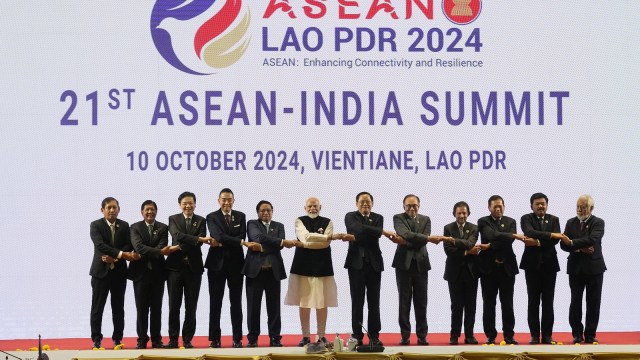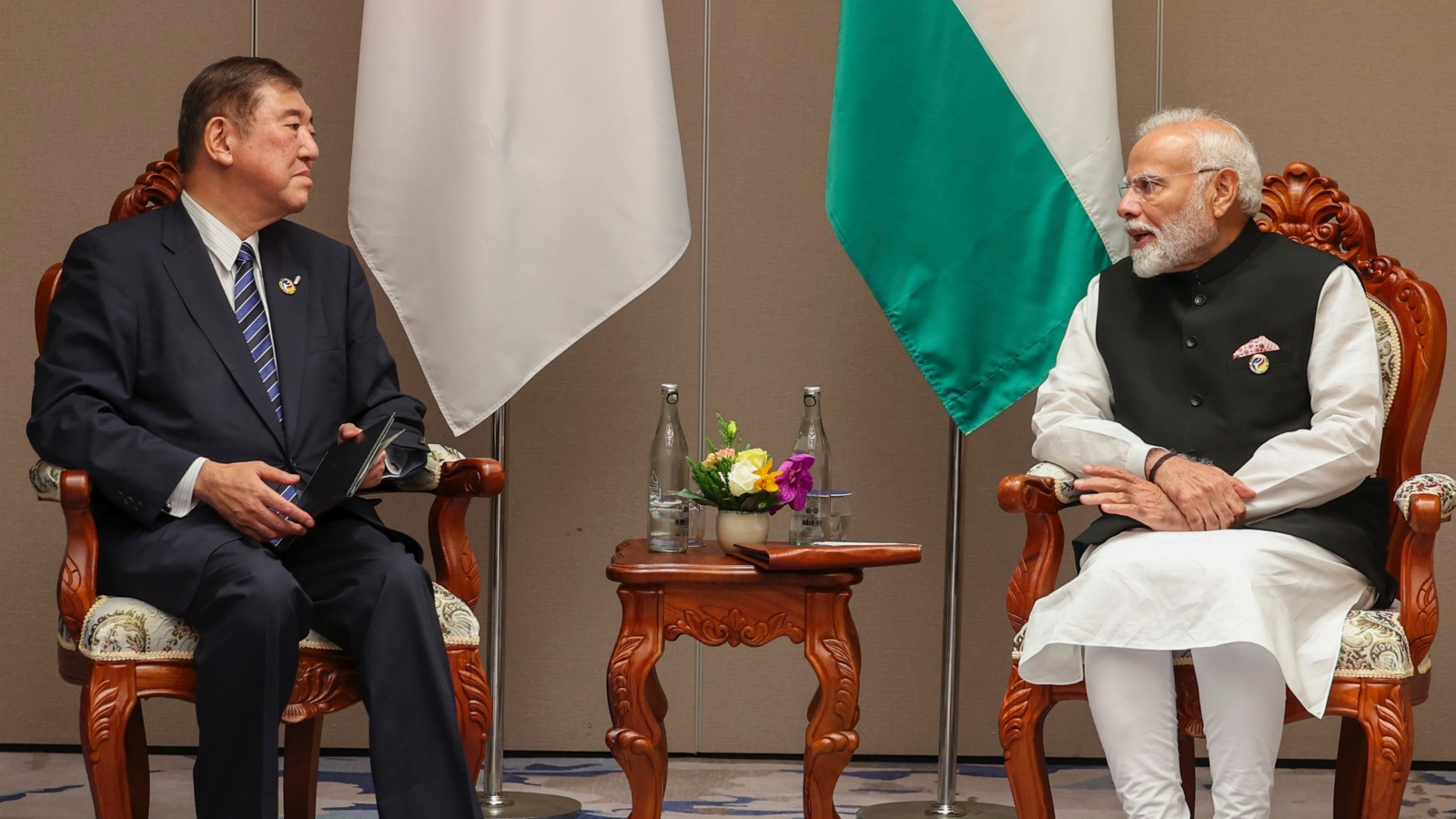Modi met Shigeru Ishiba, the new Prime Minister of Japan, on the sidelines of the summit.

In a post on X, Modi said, “Had a very productive meeting with PM Ishiba. I’m happy to have met him just a few days after he became Japan’s PM. Our talks included ways to enhance cooperation in infrastructure, connectivity, defence and more. Boosting cultural linkages was also discussed.” This is the first overseas trip for Japan’s new Prime Minister who was confirmed just last week.
Speaking at the 21st ASEAN-India Summit, Modi also announced a 10-point plan to mark a decade of India’s Act East Policy that included ASEAN-India Cyber Policy Dialogue, 2025 as ASEAN-India Year of Tourism, doubling the number of scholarships at Nalanda University among others.
“We are neighbours, partners in the Global South, and a rapidly growing region in the world. We are peace-loving nations that respect each other’s national integrity and sovereignty.”
“I believe that the 21st century is the ‘Asian Century’, a century for India and ASEAN countries. Today, when there is conflict and tension in many parts of the world, the friendship, coordination, dialogue and cooperation between India and ASEAN are of utmost importance,” he said.
 Prime Minister Narendra Modi with Japanese PM Shigeru Ishiba during a bilateral meeting, in Vientiane, Laos, Thursday, Oct. 10, 2024. (PTI Photo)
Prime Minister Narendra Modi with Japanese PM Shigeru Ishiba during a bilateral meeting, in Vientiane, Laos, Thursday, Oct. 10, 2024. (PTI Photo)
In keeping with the theme of ‘Enhancing Connectivity and Resilience’, the Prime Minister announced a 10-point plan:
Story continues below this ad
* Celebrating 2025 as ASEAN-India Year of Tourism for which India will make available USD 5 million towards joint activities;
* Celebrate a decade of Act East Policy through several people centric activities including Youth Summit, Start-up Festival, Hackathon, Music Festival, ASEAN-India Network of Think Tanks and Delhi Dialogue;
* Organise ASEAN-India Women Scientists Conclave under ASEAN-India Science and Technology Development Fund;
* Doubling the number of scholarships at Nalanda University and provision of new scholarships for ASEAN students at Agricultural Universities in India;
* Review of ASEAN-India Trade in Goods Agreement by 2025;
Story continues below this ad
* Enhancing Disaster Resilience for which India will make available USD 5 million;
* Initiate a new Health Ministers’ track towards building Health Resilience;
* Initiate a regular mechanism of ASEAN-India Cyber Policy Dialogue towards strengthening Digital and Cyber Resilience;
* Workshop on Green Hydrogen; and
* Invited ASEAN Leaders to join the ‘Plant a Tree for Mother’ campaign towards building climate resilience.
Story continues below this ad
Referring to the tension in the Indo-Pacific and the South China Sea, the Joint Statement on strengthening ASEAN-India Comprehensive Strategic Partnership for Peace, Stability and Prosperity in the Region in the context of the ASEAN Outlook on the Indo-Pacific (AOIP) with the support of India’s Act East Policy (AEP), said that they reaffirm the “importance of maintaining and promoting peace, stability, maritime safety and security, freedom of navigation and overflight in the region, and other lawful uses of the seas, including unimpeded lawful maritime commerce and to promote peaceful resolutions of disputes, in accordance with universally recognised principles of international law, including the 1982 UNCLOS, and the relevant standards and recommended practices by the International Civil Aviation Organization (ICAO) and the International Maritime Organization (IMO)”.
“In this regard, we support the full and effective implementation of the Declaration on the Conduct of the Parties in the South China Sea (DOC) in its entirety and look forward to the early conclusion of an effective and substantive Code of Conduct in the South China Sea (COC) that is in accordance with international law, including the 1982 UNCLOS,” it said.
They agreed to “strengthen cooperation in maritime security, counter-terrorism, cybersecurity, military medicine, transnational crime, defence industry, humanitarian assistance and disaster relief, peacekeeping and demining operations and confidence building measures. This will be achieved through the exchange of visits, joint military exercise, maritime exercise, port calls by naval ships and defence scholarships.”
India and ASEAN also agreed to cooperate on “emerging technologies including Artificial Intelligence (AI), Blockchain technology, Internet of Things (IoT), Robotics, Quantum Computing, 6-G technology, building and strengthening of startups ecosystem with special emphasis on digital connectivity and financial technology”.
Story continues below this ad
They also issued a joint statement on “advancing digital transformation”, which covered areas of digital public infrastructure, fintech, cybersecurity among other themes.
Modi said that over the last 10 years, India’s “trade with the ASEAN region has nearly doubled, surpassing USD 130 billion”.
The 10 member states of ASEAN – Indonesia, Thailand, Singapore, Philippines, Vietnam, Malaysia, Myanmar, Cambodia, Brunei and Laos – gathered amid the civil war in Myanmar and territorial tensions in the South China Sea. Myanmar sent Foreign Ministry permanent secretary Aung Kyaw Moe to the summit, its first high-level representative at the summit in three years, after ASEAN barred it from sending political representatives in late 2021.



 Prime Minister Narendra Modi with Japanese PM Shigeru Ishiba during a bilateral meeting, in Vientiane, Laos, Thursday, Oct. 10, 2024. (PTI Photo)
Prime Minister Narendra Modi with Japanese PM Shigeru Ishiba during a bilateral meeting, in Vientiane, Laos, Thursday, Oct. 10, 2024. (PTI Photo)




